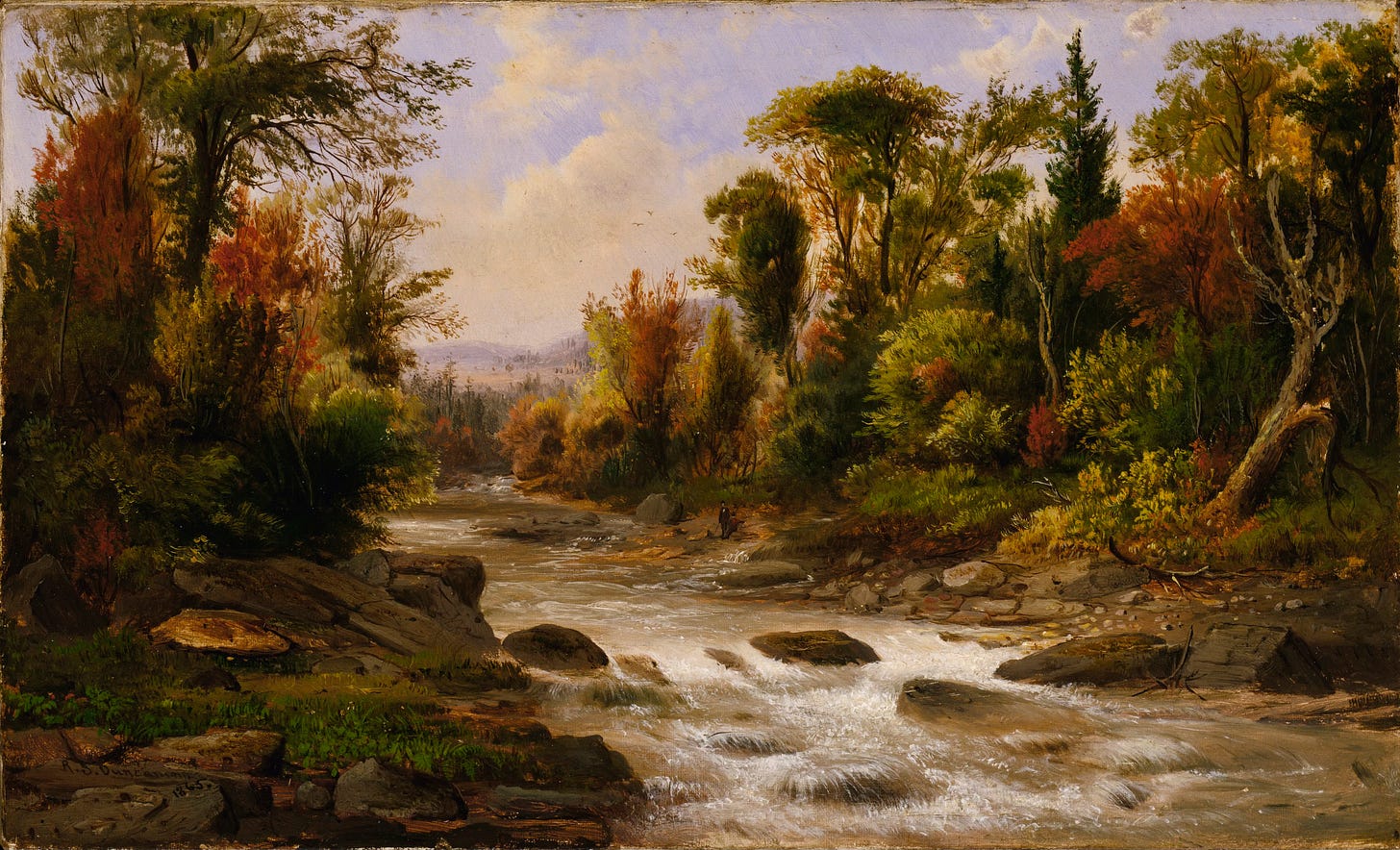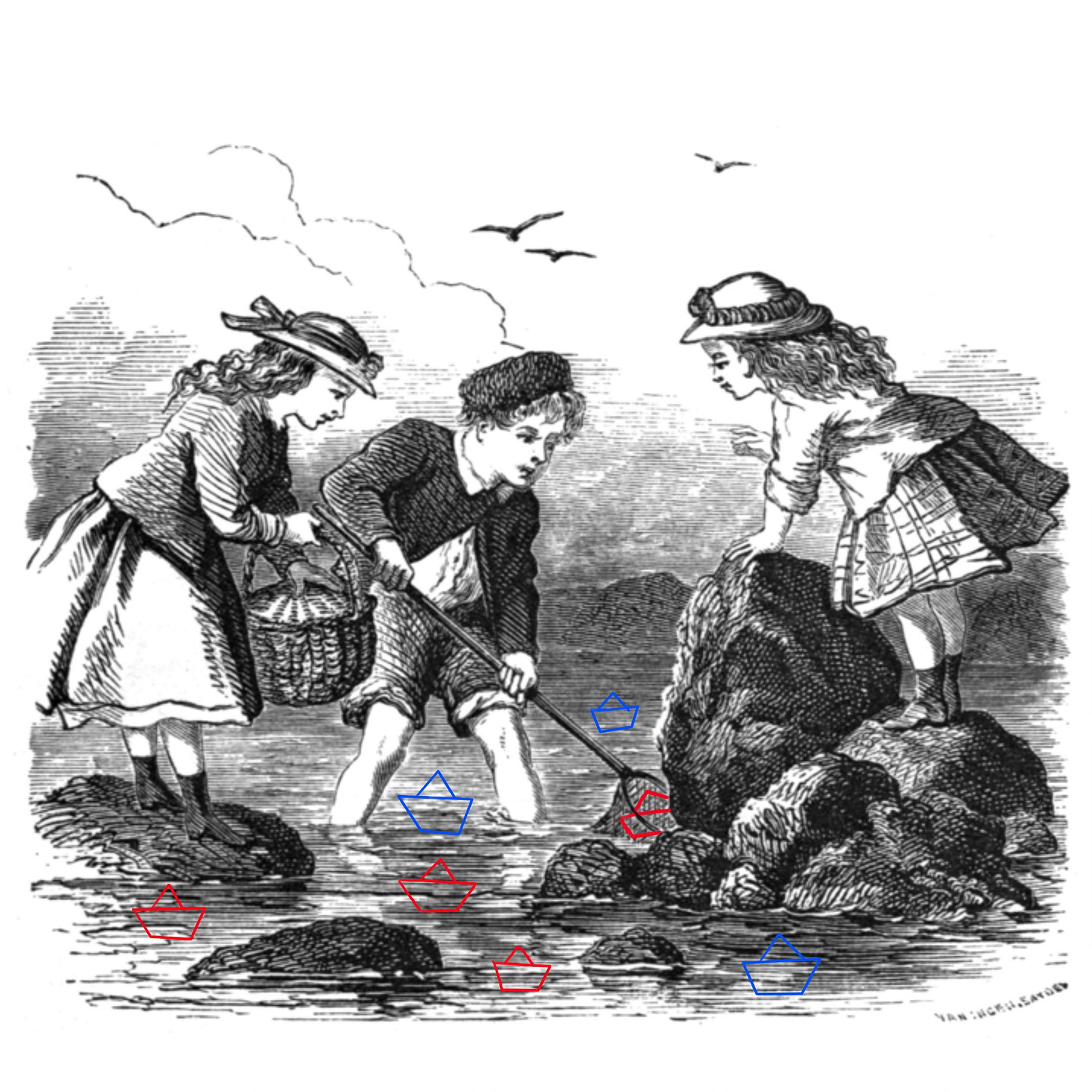Consuming Information Brings Both Knowledge And Falsity
Consume less information, be critical about the sources, and think critically.
Critical thinking is important but it can also be time consuming and effortful.
But critical thinking isn’t the only knob we can turn to keep falsity at bay. When it comes to parsing knowledge from falsity, I think of critical thinking as the last line of defence.1 In this essay, I want to discuss two simple concepts that should be considered alongside “thinking critically.”
Let’s start off by imagining the process of distinguishing knowledge from falsity, as a stream. Inside Out style.2 So, the information that we consume, floats from the source downstream, in the form of little paper boats, until it passes through the estuary and into our belief system. The more information we consume, the more paper boats float down this stream. The paper boats come in two different colours. Blue boats carry knowledge, while red boats carry falsity.3 Ideally we want to base our beliefs on knowledge and to avoid all falsity. So, we’re trying to only let blue boats float down the stream. No red boats.
But the problem is that when you’re consuming information you’re not only gaining knowledge but also falsity. In fact, you cannot gain knowledge without falsity. This is so fundamental that most people probably don’t think twice about it. You cannot just have the blue boats. There will always be at least some red boats.
For example I read American Prometheus, the book that the movie Oppenheimer was based on and the biography on J. Robert Oppenheimer. I felt like the book gave me a good overview Oppenheimer’s character. But undoubtedly this book contained inaccuracies. The book is 721 pages long there’s no way every single sentence is accurate. So, I definitely picked up inaccuracies (red boats) about Oppenheimer alongside the facts (blue boats).
This is the case for pretty much all sources of information. Whether it’s the latest peer-reviewed journal article with an extensive reference list published in a high impact journal or a 30 second TikTok. There will always be some falsity that you pick up. Although the ratio of knowledge to falsity varies drastically depending on the source. Reading American Prometheus probably triggers more blue boats and less red boats to float down the stream than most YouTube videos on Oppenheimer.
Falsity is something we want to avoid. So, gaining falsity is obviously problematic. A harmless falsity may cause you to be wrong about the capital city of Australia. But more problematic falsities will not only lead you to seek out things that are false, but also reject things that are true. An inaccurate understanding of the world makes it a lot more difficult to achieve your goals.
Whenever you’re consuming information you are deciding to let falsity into your life. So, how to deal with this constant impeding risk of obtaining falsity? How do we deal with this blue boat, red boat situation?
I’ve already hinted at these concepts above but the two big ones in my opinion are consuming less information and being selective about the sources you get information from.
The easiest approach is limiting the total number of boats floating down the stream towards your belief system. In other words, consuming less information. Or you can go one step further and consume no information. Then there will be no boats.4 No red boats, but also no blue boats. So, it’s always a trade-off.
Another approach is avoiding information from sources where the ratio of blue to red boats is going to be pretty poor. These are sources that seem like a bad trade-off from the get go. Sources where the risk of falsity is just too high. Examples for me include the news (mostly), pop psychology books, memoirs by politicians, US presidential debates, and Instagram stories about emotionally charged topics. Everyone has their own lists but these are some of the things I avoid.
These are the two approaches that lie upstream. They control the flow of boats. Critical thinking, although very important, only comes into play in the estuary. Thinking critically is all about picking out individual falsities. It’s like standing on the side of the stream and trying to fish out single red boats with a net. It’s time intensive, effortful, and you are undoubtedly going to miss some red boats. Importantly, your ability to remove red boats will strongly depend on how many boats are floating down the stream.
If you’re flicking through book summaries between sets at the gym, listening to an audiobook on 2x speed on the walk to the bus home in an desperate attempt to hit your reading goal of 52 books a year, only to listen to a podcast while cooking, and then to watch YouTube videos during dinner, you’ll have an never ending stream of boats. There are so many boats that using the net is futile. You have no space to scrutinise the information. You are simply a sponge. You absorb the information, no questions asked. This example is slightly hyperbolic but even a more tame version of this can lead to chaos. I’d know because I’ve been there.
Let’s say you’re reading a book slowly. You’re scrutinising every line. You check out the sources for every claim. There will be few boats. You’ll have space to think critically.5 And if you choose to use your net, you can almost pick out every red boat (some will however still slip through the cracks). Again slightly hyperbolic, this is not really how most people approach things but it illustrates the point, if you consume less information, you’ll have more time to scrutinise it.
People mostly focus on the quantity of the information they consume, but not on the quality.
There were times when I thought that I’ll be happy once I’d think critically. Even when we think critically, it’s naïve to think that we can always parse knowledge from falsity. If this were so, then a lot of information wouldn’t include falsity in the first place. Critical thinking is important but it’s not bulletproof. You cannot think critically all the time and even if you did you wouldn’t catch every falsity. I do think most people, including myself, would benefit from thinking critically more often. But it’s also important to remember that critical thinking isn’t our only tool in staying clear of falsity. It’s a part of a web other habits. Habits which are even easier and possibly more impactful.
I belief that critical thinking has two main purposes: to filter information coming in and to question beliefs you already hold.
The same way that Inside Out is not an accurate representation of human emotions, this metaphor is also imperfect.
This essay does not acknowledge The Relativity of Wrong, boats either contain knowledge or falsity. But things aren’t usually that black and white. For example, Einstein’s Theory of Relativity replaced Newton’s Theory of Mechanics. Newton’s Theory of Mechanics may be less accurate than the Theory of Relativity, but it’s still more accurate than Aristotle’s Physics.
Another shortcoming of this metaphor: There are other ways we can form beliefs such as through experience.
You still have to make the effort to think things through of course, consuming less information does not equate thinking critically by default.




Felt a little hurt by your rejection of pop psych, but then I googled "pop psychology books" and the first 10 or so listed were indeed red boat garbage, so fair enough.